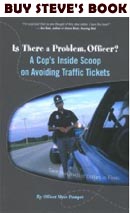Washington’s new cell phone law is bad law for so many reasons, so where to start? First, and perhaps most ridiculous, is that this law is redundant to begin with and it’s truly flabbergasting how every proponent deftly evades this reality. Laws like this serve only to make law-breakers out of formerly law-abiding drivers.
Previous to this law, if an officer observed a distracted driver posing an articulable danger to others, the officer already had the authority to stop that driver and issue a citation if appropriate. This already included driving with a cell phone to his or her ear, or for that matter, while applying make-up, reading a map, or doing a crossword puzzle. Today the law allows law enforcement officers to stop a driver simply holding a phone to his or her ear, even absent putting any other drivers at articulable risk.
Here’s another reason why this is bad law. Americans tend to have a strong sense of fairness; they generally know the difference between getting a fair shake and government overstepping. When a cop stops a driver who’s talking on a cell phone, something he or she’s been doing safely for years, respect for all laws and by extension all law enforcement is diminished.
When the government enacts such statist edicts, giving government officials more and easier authority to interfere in its citizens’ pursuit of happiness, those citizens bristle and eventually get angry, having gotten pretty damned fed up with a paternalistic nanny government who feels no compunction at restricting individual liberty in deference to socialistic goals.
Unfortunately we have too many statist politicians and community organizers afflicted with the do-something disease, or I should say, government-do-something disease, frothing at the mouth to pass more repressive laws. For too long these folks have based political “success” on how much tax money they can divert to pet pork projects and how many laws they can pass.
Well, it’s well past time for a paradigm shift: Politicians need a new barometer for measuring “success,” and a new litmus test for deciding public policy. This new perspective should judge success not by how many laws a politician enacts, but by how many laws he or she repeals.
As for an American public policy litmus test, from the smallest village council to the U.S. Congress, how about the preeminent question asked when considering any law is, how does this law affect individual liberty?
How many unnecessary or redundant rules, regulations, and taxes can my political representatives repeal? That’s what I want to know. Repealing burdensome taxes, oppressive regulations, and nanny-statist laws, such as the new Washington cell phone law, would be a great start.
The most I want my representatives to do for me is the least they can do for me.




0 Comments